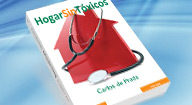
NOTICIAS
Carta al Presidente de la Comisión Europea sobre disruptores endocrinos
Desde la Fundación Vivo Sano hemos firmado una carta enviada al Presidente de la Comisión Europea, donde diversas organizaciones expresan su preocupación por la amenaza que suponen los disruptores endocrinos y la necesidad de reducir nuestra exposición a los mismos. A continuación, el texto de la carta (en inglés):
Dear President Barroso, Dear Commissioners Tajani, Potočnik, and Borg,
We, the undersigned environmental, occupation/workers, and health organisations are writing to express our concerns about a matter of urgency for the health of EU citizens and wildlife. You will soon be taking key decisions on Endocrine Disrupting Chemicals (EDCs), which the World Health Organisation (WHO) and United Nations Environment Programme (UNEP) have called a global threat that needs to be resolved.
Your decisions could set the path for significantly reducing exposure to these hazardous chemicals, reducing European national economies’ spending on endocrine related diseases, promoting green chemistry and safer products in the EU, and ensuring EU leadership in global chemicals management.
With the Europe 2020 strategy, the EU has set itself the goal of becoming a smart, sustainable and inclusive economy. We believe that acting on EDCs will make a significant contribution to greater sustainability and lead to a more efficient use of resources through the development of better, safer, and greener chemicals, and ultimately strengthen the competitiveness of Europe’s chemical industry. In addition, economic recovery starts with a healthy population. Reducing exposure to EDCs will bring significant health benefits in the short and long term.
The weight of scientific evidence, as outlined in the recent review by the WHO and UNEP, tells us that EDCs are linked to serious irreversible impacts on human health and wildlife. Recent EU co-funded human biomonitoring shows certain EDCs are found in both children and their mothers. It is therefore important that the EU ensures that European health and environmental protection is not undermined by policies which disproportionately address the interests of companies producing hazardous chemicals. Exposure reduction should form the key goal of EU EDC policy.
In particular we call on the EU Commission to adopt in the coming weeks:
1) Comprehensive and workable criteria to identify EDCs Getting the criteria right for identifying EDCs is the first crucial step in achieving adequate regulation of chemicals with endocrine disrupting properties. 2) A robust and far-sighted EU EDCs Strategy
Our organisations have already provided proposals for the revision of the EU EDC Strategy1. Today, we would like to highlight one point of particular importance: The EU must develop and implement a screening and testing strategy that addresses the complexity of the endocrine system, to correctly identify which chemicals are EDCs. The existing testing requirements in the legislation are not able to do this currently.
3) Review of EDCs in REACH authorisation, based on the latest science The upcoming review on how EDCs are regulated under the REACH authorization procedure provides an important opportunity to promote the replacement of EDCs with safer alternatives. The review should ensure that an authorization for an EDC – as for Persistent, Bioaccumulative and Toxic chemicals – can only be granted if no safer alternatives are available and the use is essential to society.
Further details on these three issues are set out in the Annex.
We call on you to recognise the overwhelming evidence of the dangers of EDCs and acknowledge the conclusion from the EU Commission’s EDC conference in June 2012 and echoed in the WHO/UNEP report: a tipping point has been reached. Now you must take the necessary steps to reflect this knowledge in EU Chemicals Policy.
We also call on you to ensure European leadership in the global context as EDCs have become a priority issue in international negotiations on chemical management. Recent reports from the European Environmental Agency (EEA) and UNEP have demonstrated the costs of inaction associated with health and environmental effects of chemicals exposure and how much more expensive it is to take action later after there have been early warnings.
In view of the public interest in this matter, we intend to make the contents of this letter more widely available.
Sincerely,
Genon K. Jensen,
Executive Director, Health and Environment Alliance (HEAL)
Supported by the following organisations:
European Environmental Bureau (EEB)
Greenpeace European Unit
Pesticide Action Network Europe (PAN – E)
Client Earth
Health Care without Harm (HCWH)
Women in Europe for a Common Future (WECF)
Alliance for Cancer Prevention (ACP)
Breast Cancer UK
BUND Friends of the Earth Germany
Cancer Prevention and Education Society (CPES)
Center for International Environmental Law (CIEL)
Chem Sec CHEMTrust
Danish Ecological Council
Ecologistas en Acción
Fundación Vivosano
Générations Futures Réseau Environnement Santé (RES)
Swedish Society for Nature Conservation




